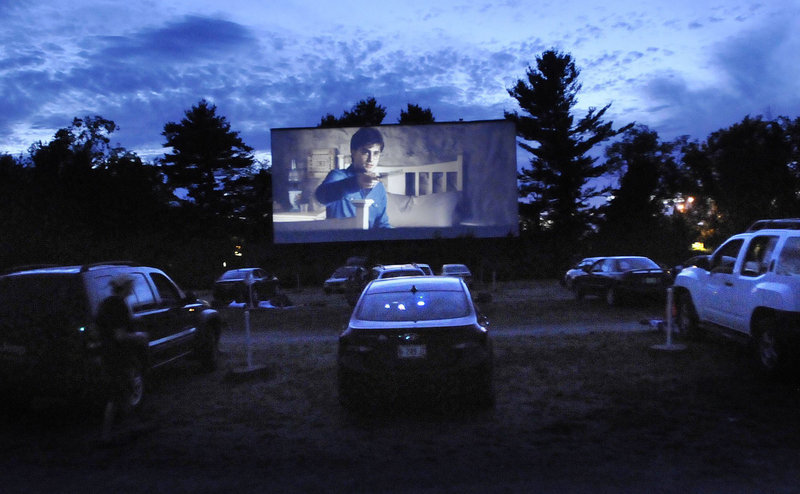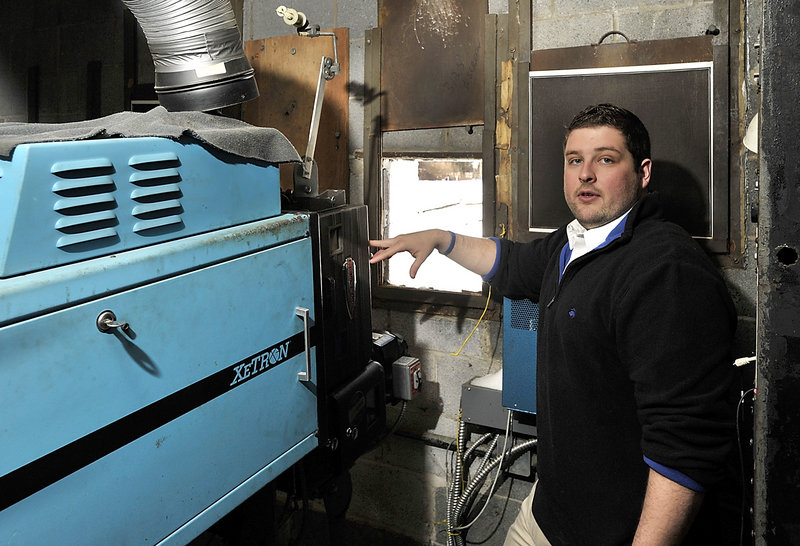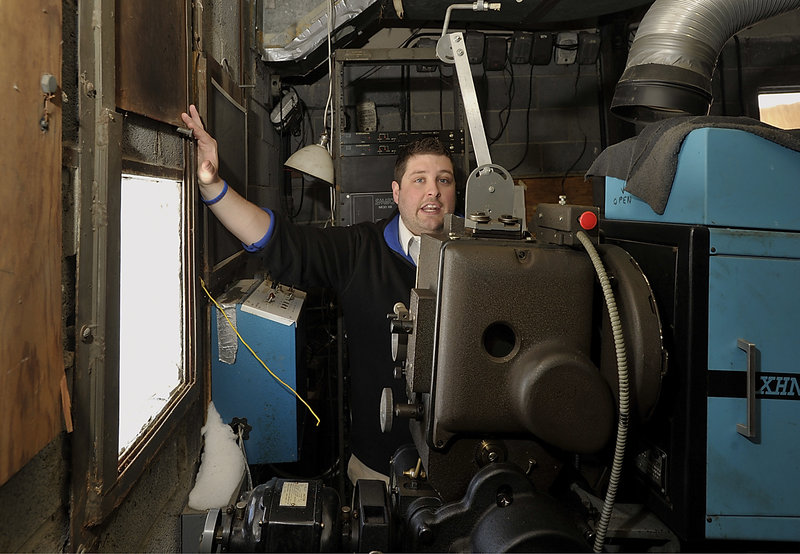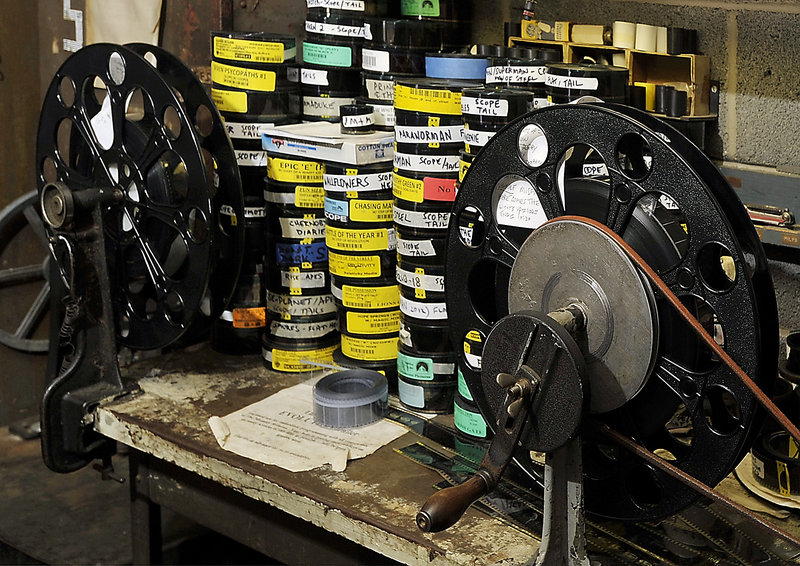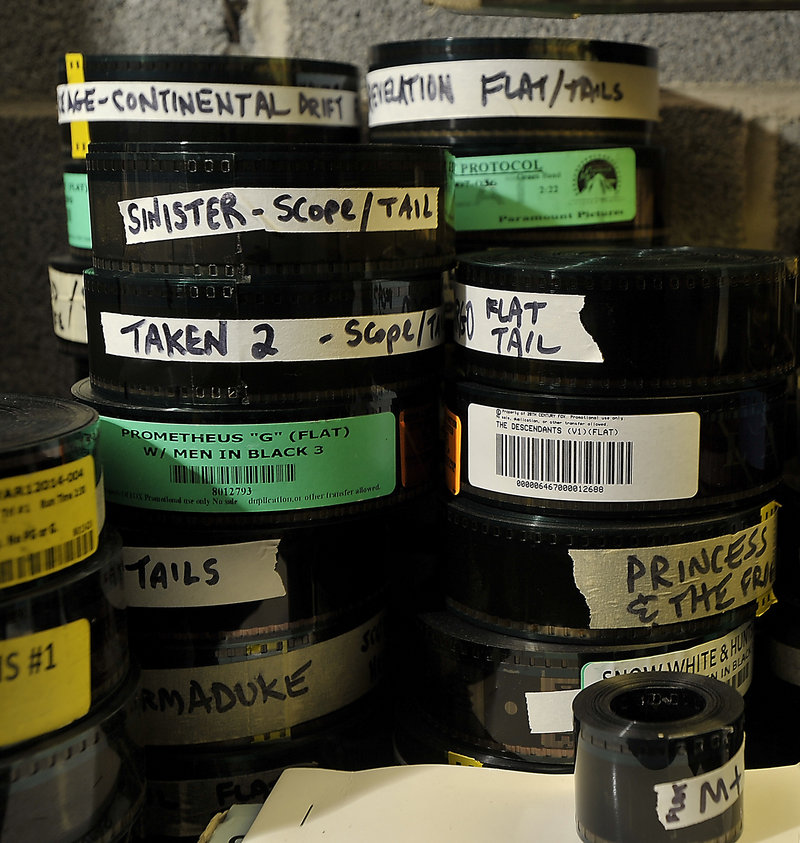SACO – It’s do-or-die time for the Saco Drive-In.
As movie studios move away from 35 mm film and firmly into the digital age, the nation’s second-oldest drive-in theater faces the prospect of being left behind.
Without a digital conversion that could cost as much as $90,000, the drive-in theater will have to retire its giant screen, said Ry Russell, the Saco native who runs the summer theater.
Faced with the “heartbreaking” prospect of closing the theater, which opened in 1939, Russell said he is turning to the community for help in saving a local landmark.
“This is a lot bigger than this theater,” Russell said. “This is one of 10,000 theaters struggling to stay above water.”
Movie studios plan to stop producing the large reels of 35 mm film that theaters like the Saco Drive-In have used for decades. Theater operators say they don’t know exactly when the distribution of film reels will stop, but they expect it will happen this year.
While larger, chain-operated movie theaters have already converted to digital, many small independent theaters now face a deadline to move away from film and into digital technology. That’s a challenge for them because the new equipment costs tens of thousands of dollars.
“Larger theaters converted to digital a few years ago,” said John Tevanian, owner of the Bridgton Twin Drive-In. “Once they did that, the writing was on the wall: If you plan on being in this business for more than a year or two, you have to convert to digital.”
Tevanian has started converting his two-screen drive-in, but said the entire process will take until next year. This year, he is constructing a new building to house the digital equipment he plans to have by the start of the 2014 season.
He estimates that the conversion will cost $130,000 — plus at least that much for the new building. He is confident that he will be able to get movies on 35 mm film for all of this season, which runs from spring to early fall.
Tevanian said 83 percent of the movie screens in the country have already been converted, and 90 percent are expected to be digital by the end of this year.
While most indoor theaters have made the switch, only about 10 percent of the country’s 606 drive-in theaters have, according to the National Association of Theatre Owners.
Digital cinema provides consistent quality and is less expensive to produce and distribute, according to the association.
The conversion is expensive and may not be the wisest investment, Tevanian said, but he couldn’t just walk away from the drive-in that his father bought 40 years ago.
Fans of the Bridgton Twin Drive-In have offered to help raise money, but Tevanian said the best way they could help was by buying movie tickets. He turned down offers of donations and fundraisers.
“If I was going to stay in business, that meant I was all in,” he said. “When I made the announcement on my Facebook page last year, I said to the folks (that) a sane person would look at the numbers and walk away. Sometimes you do things that perhaps economically aren’t the smartest move, but you only live once.”
The operators of the Prides Corner Drive-In in Westbrook could not be reached for comment.
The Saco Drive-In isn’t the only Maine theater to ask for community help to cover the cost.
Jason Sheckley, owner of the Harbor Theatre in Boothbay Harbor, turned to the community to help with the one-screen theater’s digital conversion.
Open since 2002, the independent theater is a “labor of love” that doesn’t turn a profit, Sheckley said.
About 150 people donated a total of $50,000, just enough to buy the digital projection equipment that will be installed this spring.
Though the money has been raised, Sheckley is worried about the future of independent theaters.
“I don’t know if it’s a blessing or a curse to be able to convert the theater,” he said. “We think a good number of theaters are going to go out of business because of this.”
Sheckley is reluctant to move away from film, which he now plays with carbon arc projectors from the 1930s. With that setup, he can show both old and new films — something that will end when he makes the conversion.
“I’m not impressed with the way digital looks,” said Sheckley, a longtime projectionist. “I think the digital has been forced on theaters because it’s something to save money for the businesses that run the studios.”
Audiences at the Nickelodeon in downtown Portland may not have noticed the cinema’s digital conversion, but staff members noticed “a huge difference in clarity, contrast and brightness of color,” said Assistant Manager Ben Howard.
And there’s no longer any worry about the film breaking, he said. The theater, part of the Patriot Cinemas group, completed the conversion for all six screens in three days in December.
“It was kind of a convert-or-die situation,” Howard said. “It’s the way forward. It was a lot for some of us to learn, but now that we have it all set up, the advantages are clear.”
Russell, from the 74-year-old Saco Drive-In, said he is confident that people who have long connections to the theater will help keep the tradition alive.
Taking out a business loan isn’t an option because it would be difficult to cover loan payments while running the theater, which doesn’t turn a profit, he said.
In addition to buying digital projection equipment, Russell must alter the projection booth to make sure it is climate-controlled.
Russell is using Facebook — where the drive-in has more than 16,000 fans — to rally support. Donations are accepted through the Facebook page, and Russell said there will likely be fundraising events, such as bake sales and an all-day concert. So far, he has raised $1,900 toward his $75,000 goal.
While he is focused primarily on keeping the theater open, Russell also is collecting families’ stories about their experiences at the drive-in. Many of the stories about family bonding, nights out with friends and traditions passed down through generations bring him to tears, he said.
“It will kill me if I have to close,” he said. “There will be a ‘closed’ sign on the door if we don’t make this happen.”
Gillian Graham can be contacted at 791-6315 or at:
ggraham@pressherald.com
Twitter: grahamgillian
Send questions/comments to the editors.



